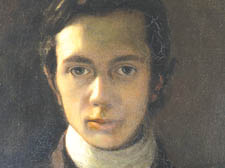|
|
 |
| |

William Hazlitt: trained as a portrait painter – here is how he saw himself aged 24 |
The first to grasp at the flaws of modernity
After falling into literary anonymity, the maverick William Hazlitt is set for his latest revival, writes Christopher Price
William Hazlitt: The First Modern Man.
By Duncan Wu. Oxford University Press order this book
THIS is a “warts and all” biography about the son of a Unitarian preacher who became a stimulating raconteur, essayist, journalist, theatre critic, grammarian and man-about-town – though often overdoing it and becoming a pain in the neck to all and sundry.
After his death in 1830 it seemed William Hazlitt might disappear into oblivion. But a succession of writers – Dickens, Robert Louis Stevenson, Somerset Maugham, Virginia Wolfe, Tom Paulin and AC Grayling – have kept reviving his literary reputation, which has led to Michael Foot’s wish to deify him into eternity.
The virtue of Duncan Wu’s biography lies in his ability to merge a mountain of new evidence about his subject with a determination to identify Hazlitt as the “first modern man”. This is not an easy task.
There were sides of Hazlitt’s persona, especially the intensity of his desire to write and publish a kaleidoscopic flow of books and articles, which today’s psychiatric community might diagnose as borderline psychotic.
In this book, Wu becomes his psychotherapist and treats Hazlitt like a favourite son. Having researched every dot and comma of (previously unknown) references to his subject, he acts as his defence counsel. His obsessive attractions of the opposite sex were normal peccadilloes at the time; as were his breaches of etiquette and narcissistic criticisms of the literary elite of the day. Though his father would have liked him to become a Unitarian minister, his move to atheism was natural.
Hazlitt’s supreme talent was his expertise in crafting the English language to the purposes of the particular treatise, article, lecture or pamphlet he was writing. His command of the nuances of English vocabulary and sentence construction, whether expressed in beautiful limpid prose or an aggressive libellous rant, was so comprehensive that many of the individuals he criticised saw it as a tribute and forgave him while his lecture audiences and loyal readership would applaud his every sentiment.
His early training had been in portrait painting, where facial expression could describe the sitter. He transferred this skill to his writing.
In the early 19th century he saw honesty, truth and freedom in the world as parallel objectives – particularly freedom. The French had had a successful revolution. Why could Britain not have one?
This obsessive concern with freedom made him a difficult friend and sometimes a disruptive dinner guest. Wordsworth, Coleridge and Southey were friends at first, but after Waterloo rapidly became renegades. He could not abide utilitarians like Bentham and Robert Owen because he saw their rationality as shallow and unleavened by feeling. But when Lord Elgin brought the Parthenon frieze to London, the purity of the feelings which he absorbed from the sculptures amply justified their removal.
Praise from Hazlitt demanded his version of freedom, his interpretation of sensibility, his taste. He saw himself, somewhat awkwardly and illogically, as both a pamphleteer on the side of the people and an unrelenting arbiter of taste.
Wu weaves together these contradictions and shortcomings with a touching sympathy and affection for an individual who endured long stretches of penury and despair – recurrent insolvency, infantile infatuation with unsuitable women, failure in his two marriages – which daily threatened his survival.
Somehow a combination of genius and chaos leads to the book’s subtitle – “The First Modern Man”. The words ‘modernity’ and modernism’ are much abused and trivialised. But there may be a sense in which he was one of the first philosophic authors with a clear perception of the shortcomings of globalisation, colonisation and the infant industrial revolution.
Having spent his early years in America, he had seen the possibility of progress in human freedom; but he could also see the necessary conditions for freedom and the obstacles in its path.
His gut instinct was that material prosperity had to be tempered by an environment of taste and beauty which could irradiate the souls of the people.
Duncan Wu has painted a convincing picture of a fascinating man with a message for us all today.
|
 |
|
 |
| |
|
 |
|



